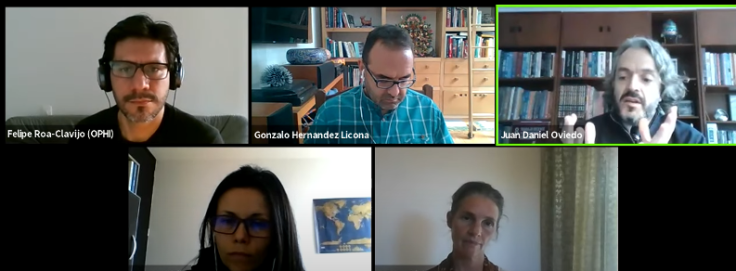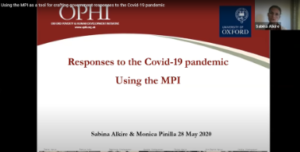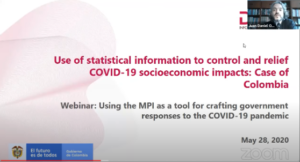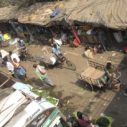
Search
Webinar: Using the MPI as a tool for crafting government responses to the COVID-19 pandemic

This OPHI-MPPN event highlighted government responses that use the MPI to respond to the COVID-19 pandemic. It presented the case of the Statistical Office of Colombia and the Vulnerability Index developed at the Oxford Poverty and Human Development Initiative.
Watch Webinar:
 Sabina Alkire and Monica Pinilla. Oxford Poverty and Human Development Initiative
Sabina Alkire and Monica Pinilla. Oxford Poverty and Human Development Initiative
One of the challenges that we are facing during the pandemic is that everyone needs fast information. However, there is also an overload of information of different types. Therefore, a methodology is necessary to consolidate the different types of data in a fast and simple way, in order to create public policies. Although, the information from the Multidimensional Poverty Indices (MPIs) can help to have an overview, it is necessary to carry out specific sectoral analyses. To do this, bespoke Multidimensional Vulnerability Indices (MVIs) can be computed tuned to public policy. Variables such as informal employment, intergenerational homes, overcrowding, hand washing facilities, mobile phone ownership for emergency response, and sharing and caring roles within the home can be included within the MVI.
In this way, the MVI can identify those most vulnerable to contracting COVID-19 and, therefore, protect and focus the emergency response on the poor and new poor. This emergency response can be complemented by cash transfers along with other vital services. Furthermore, by monitoring the MPI and using the MVI, a pro-poor recovery plan can be programmed taking into account the satisfaction of food needs, the return of the unemployed to work, the strengthening of social services and the introduction of equity.
 Juan Daniel Oviedo. Director of the National Statistics Office of Colombia (DANE)
Juan Daniel Oviedo. Director of the National Statistics Office of Colombia (DANE)
We would like to share with you the experience of Colombia in analysing the vulnerabilities that households are facing within the COVID-19 emergency. Colombia has achieved this through the integration of information in a data ecosystem that responds to the needs of users and that is helping to design public policy (http://visor01.dane.gov.co/visor-vulnerabilidad/).
For 10 years, Colombia has potentiated the Multidimensional Poverty Index (MPI) as a tool that guides public policy. After the 2018 National Population and Housing Census, Colombia for the first time collected the identification number of the households and their georeferencing in real time. This allowed us, thanks to a first exercise of integrating administrative records with the census, to comply with the standard indicators of the MPI since the five dimensions were not included in the census. In this way, thanks to this data integration, the MPI could be computed at the housing block level. Within this visualisation (http://visor01.dane.gov.co/visor-vulnerabilidad/) it can be seen that the blocks of houses are coloured according to multidimensional poverty.
Additionally, due to the state of emergency caused by COVID-19, Colombia has the possibility of integrating different databases, preserving the confidentiality of the information to design public policies with high disaggregation. In this sense, they joined the information from the 2018 census and administrative records, with information from household surveys. This made it possible to identify the poorest and most vulnerable people, deprived not only in indicators of multidimensional poverty, but also in new dimensions such as informality. Likewise, within the framework of taking advantage of available information, in Colombia the information collected by SISBEN was used. SISBEN is the identification system for potential beneficiaries of social programmes in Colombia. In the same way, SISBEN integrated the administrative records of entities that administer social programmes. This information was delivered to mayors and governments throughout Colombia to carry out targeting processes.
















